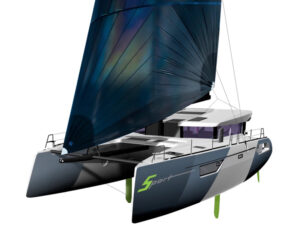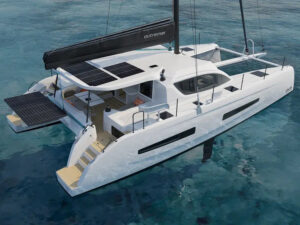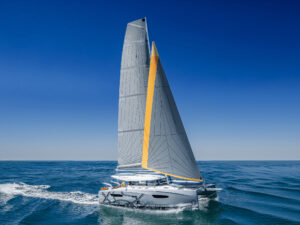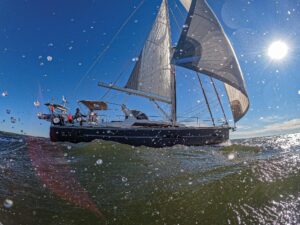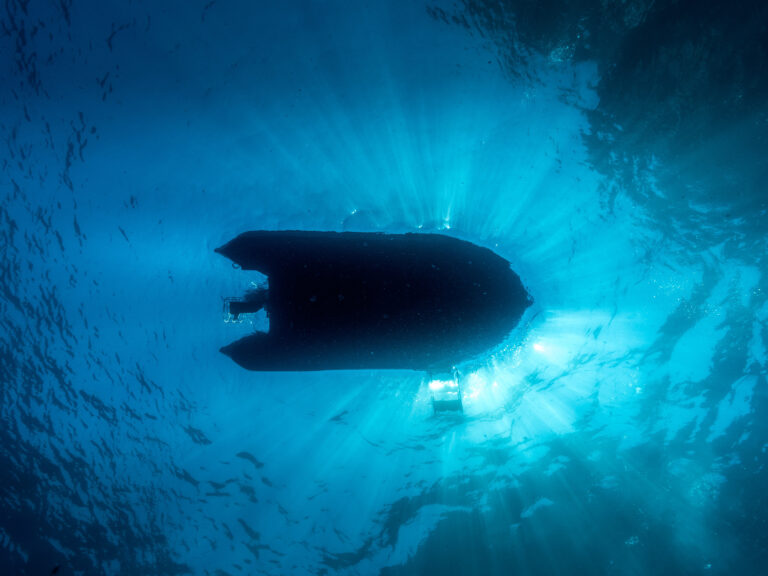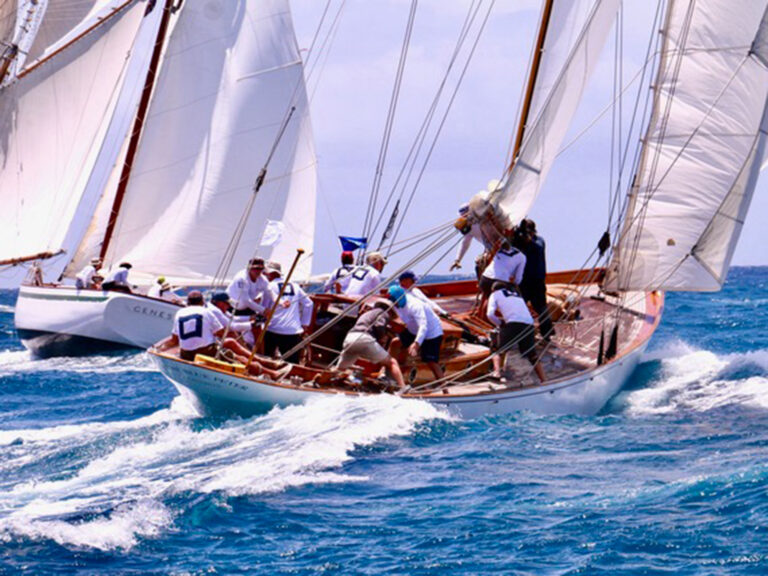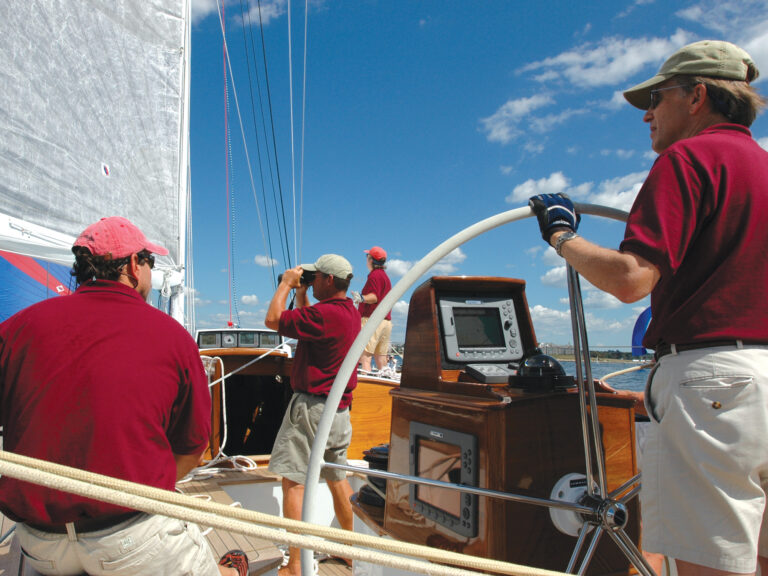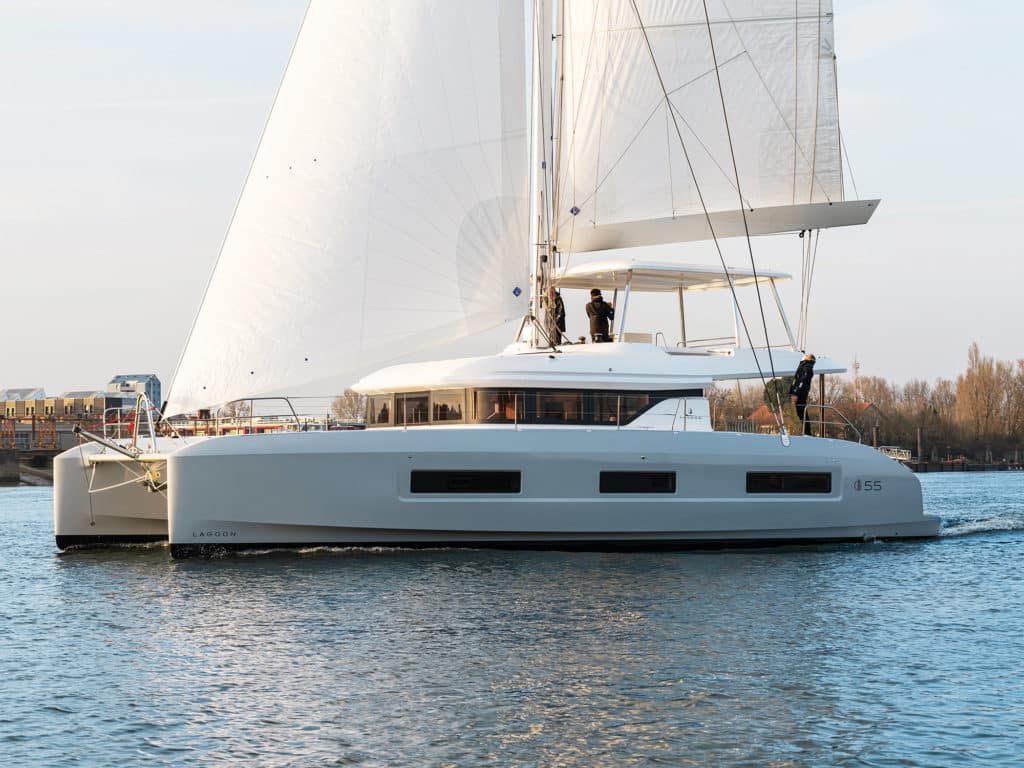
In February, French boat builder Lagoon brought Hull No. 2 of its 55-foot luxury catamaran to the Miami International Boat Show. I can easily see this long-legged bluewater cruiser finding a niche among its siblings that range in length from 40 to 77 feet.
The 55, designed by VPLP, has an interior by Nauta and exterior styling by Patrick le Quément. Given its size and systems, the 55 will likely be a boat that many private owners will staff with a captain and mate, though it’s well-laid-out for a shorthanded crew, and certainly would be suitable for an owner-skipper who is up for the job of maintenance.
And in charter, where Lagoons have long been popular? Well, let’s count the ways the 55 could be enjoyed.
First, there’s the flybridge, where the helm is located. Steps to either side ensure a good flow of traffic. The wheel is offset to starboard. Just forward of it, close at hand, three electric winches handle all the sail-control lines except for the traveler; that’s adjusted using an electric continuous-line winch whose push-button controls are mounted nearby. Abaft the helm, there’s a sink and fridge alongside a U-shaped seating area that surrounds a low cocktail table—a lovely place to sit.
Below, in the cockpit, are two more tables to starboard with tops that unfold to seat a crowd. There are also multiple cushioned lounges, all facing aft to take in the view astern. When raised, the swim platform/tender storage area provides a balcony over the water. Lowered, it’s a place to sit and hang feet in the water.
Directly forward of the cabin house, there’s another U-shaped seating area, and the center window in the saloon opens so refreshments can be passed out to anyone sitting there. The 55 has a self-tacking jib, with a sheet that’s led to a track on the coachroof just ahead of the mast, keeping lines out of the way on the foredeck. There is also a sprit with an electric furler for a code zero. During the show, the boat was rigged with a cloth sunshade over the forward seating area, held aloft by a pair of removable carbon-fiber poles.
The boat in Miami carried a price tag of $2.2 million. That included options such as teak soles on the flybridge, in the cockpit and on the transoms; air conditioning; extra refrigeration; a washer and dryer amidships in the port hull; a pair of upgraded 115 hp Nanni engines with saildrives (80 hp diesels are standard); and a suite of B&G electronics.
Lagoon offers a number of interior layouts. This boat had four staterooms. The owner’s en suite stateroom was aft in the starboard hull, with a smaller guest stateroom forward. On the port side, two additional guest staterooms sat fore and aft, with a crew cabin (with its own head and shower) in the forepeak. The interior volume in the hulls allowed all the guest berths to be laid out athwartships.
Five- and six-stateroom layouts are also available, and an owner can choose to have the galley up or down. All told, the 55 could have berths for 16 people.
Throughout the interior, ports and hatches abound, letting in lots of light and providing views of the world outside. In my notes, I jotted down “elegant” to describe the boat’s look and feel.
Under power at a cruising rpm of 2,000, we saw readings of about 9 knots on the GPS. The steering seemed a bit sluggish both motoring and under sail, but the boat had arrived just prior to the show, and I’d suspected that it just needed an adjustment.
The breeze barely broke 10 knots on our sea trial, and we weren’t able to fly the code-zero sail due to missing gear, but with the self-tacker set, we moved along closehauled at about 6 knots, and gained another knot and a half by bearing off to a beam reach.
It was a comfortable ride. Sailing along, it didn’t take me long to find my sweet spot on the 55: the seat incorporated into the far forward lifeline stanchion, where I hung one arm over the wire and sat watching the bows slice through the waves. Believe me when I say that I could have stayed there all day.
Mark Pillsbury is a CW editor-at-large.

